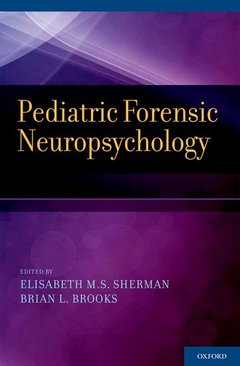Description
Pediatric Forensic Neuropsychology
Coordinators: Sherman Elisabeth M.S., Brooks Brian L.
Language: English
Subjects for Pediatric Forensic Neuropsychology:
Publication date: 02-2012
400 p. · 16.1x23.6 cm · Hardback
400 p. · 16.1x23.6 cm · Hardback
Description
/li>Contents
/li>Biography
/li>
Pediatric Forensic Neuropsychology is the definitive reference on the practice and process of civil forensic neuropsychological assessment of children and adolescents. An elite, knowledgeable, and expert group of authors were assembled in order to produce the first text dedicated specifically to pediatric forensic neuropsychology. This volume covers core topics pertaining to forensic neuropsychological assessments of children and adolescents, such as the role of pediatric neuropsychology in the courtroom, ethical issues, and practical issues in private forensic practice. Other chapters discuss the foundations of pediatric neuropsychological assessment, and include discussion of neuropsychological test selection, base rates, interpreting change, and sub-optimal performance. In addition, the text covers forensic evaluations of specific pediatric populations including those suffering postconcussion syndrome and mild traumatic brain injury, moderate to severe traumatic brain injury, and medical malpractice cases, as well as the independent educational evaluation. Further chapters discuss premorbid and post-injury factors, and conditions important in the forensic neuropsychological evaluation of children including moderator variables and diversity, psychological and psychiatric conditions, and ADHD and LD. The book is intended primarily for neuropsychologists who engage in forensic work. Although the topics will be of most interest to those who assess children and adolescents, the topics will also be of interest to neuropsychologists who conduct forensic evaluations with adults. The text will also be useful for attorneys, and medical professionals involved in forensic evaluations, such as clinical psychologists, psychiatrists, neurologists, and physiatrists.
Contributors. Introduction. PART ONE: Theoretical, Conceptual, and Psychometric Issues in Pediatric Forensic Neuropsychology. 1. Pediatric Neuropsychology in Forensic Proceedings: Roles and Procedures in the Courtroom and Beyond. Jerry J. Sweet and Michael Westerveld. . 2. Ethical Issues in Pediatric Forensic Neuropsychology. Shane S. Bush, William S. MacAllister, and Alan Goldberg. . 3. Basic Psychometrics and Test Selection for an Independent Pediatric Forensic Neuropsychology Evaluation. Cecil R. Reynolds and Arthur MacNeill Horton, Jr.. . 4. Improving Accuracy When Identifying Cognitive Impairment in Pediatric Neuropsychological Assessments. Brian L. Brooks and Grant L. Iverson. . 5. Interpreting Change in Repeated Neuropsychological Assessments of Children. Grant L. Iverson. . 6. Differential Diagnosis of Malingering and Related Clinical Presentations. Daniel J. Slick and Elisabeth M.S. Sherman. . 7. Overview of Tests and Techniques to Detect Negative Response Bias in Children. Michael W. Kirkwood. . 8. Forensic Issues in Neuropsychological Assessment: Culture and Language. Danielle N. Landwher and Antolin M. Llorente. . 9. Interpretive Confounds in the Independent Pediatric Neuropsychological Evaluation. Jacobus Donders. . PART TWO: Applied Clinical Issues in Pediatric Forensic Neuropsychology. 10. Independent Neuropsychological Evaluation of Children With Mild Traumatic Brain Injury. Gerard A. Gioia, Christopher G. Vaughan, and Peter K. Isquith. . 11. Independent Neuropsychological Evaluation of Children With Moderate to Severe Traumatic Brain Injury. Keith Owen Yeates. . 12. Preinjury and Secondary Attention-Deficit/Hyperactivity Disorder in Pediatric Traumatic Brain Injury Forensic Cases. Jeffrey E. Max, Russell J. Schachar, and Tisha J. Ornstein. . 13. Independent Neuropsychological Evaluation of Children in Medical Malpractice Cases. Ida Sue Baron and Joel E. Morgan. . 14. Neuropsychological Contributions to Independent Education Evaluations: Forensic Perspectives. Lisa G. Hahn and Joel E. Morgan. . PART THREE: The Pediatric Forensic Toolbox. Exhibit A. Sample Consultant-Attorney Agreement. Exhibit B. Sample Pediatric Forensic Informed Consent Form (Short Version). Exhibit C. Sample Pediatric Forensic Informed Consent Form (Longer Version). Exhibit D. Sample Letter to Parents About Neuropsychological Assessment. Exhibit E. Sample Letter to Teacher About Neuropsychological Assessment. Exhibit F. Sample Consent Form for Release of Information From School. Exhibit G. Checklist for a Pediatric Independent Neuropsychological Evaluation Interview. Exhibit H. Sample Traumatic Brain Injury Interview Form. Exhibit I. Sample Background and History Questionnaire. Index.
Elisabeth M.S. Sherman is the Neuropsychologist and Adjunct Assistant Professor in the Departments of Pediatrics and Clinical Neurosciences and the Director of Pediatric Neuropsychology Fellowship, Alberta Children's Hospital and University of Calgary. Brian L. Brooks is a Neuropsychologist at the Alberta Children's Hospital in Calgary, Alberta and an Adjunct Assistant Professor in the Departments of Pediatrics and Clinical Neurosciences and at the University of Calgary.
© 2024 LAVOISIER S.A.S.




